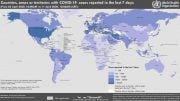
Hair loss was significantly associated as a symptom of Long Covid, one of 62 symptoms revealed in the latest research.
Health records from 2.4 million people in the UK suggest that 61 symptoms part of wider Long Covid experience, and that certain key demographic groups more at risk.
Long Covid sufferers have experienced a wider set of symptoms than previously thought, new research has found. These symptoms include hair loss and sexual dysfunction.
A new study found that patients with a primary care record of infection with the virus that causes COVID-19 (SARS-CoV-2 coronavirus) reported 62 symptoms much more frequently 12 weeks after initial infection than those who hadn’t contracted the virus. The report was published in the journal Nature Medicine on July 25, 2022.
Anonymized electronic health records of 2.4 million people in the UK were analyzed by researchers from the University of Birmingham alongside a team of clinicians and researchers across England. The study was funded by the National Institute for Health and Care Research and UK Research and Innovation. The data taken between January 2020 and April 2021 comprised 486,149 people with prior infection, and 1.9 million people with no indication of coronavirus infection after matching for other clinical diagnoses.
“This research validates what patients have been telling clinicians and policy makers throughout the pandemic, that the symptoms of Long Covid are extremely broad.”
— Dr Shamil Haroon, senior author
Using only non-hospitalized patients, the research team was able to identify three categories of distinct symptoms reported by people with persistent health problems after infection.
Patterns of symptoms tended to be grouped into respiratory issues, mental health and cognitive problems, and then a broader range of symptoms. While the most common symptoms include anosmia (loss of sense of smell), chest pain, shortness of breath, and fever; other commonly reported symptoms include:
- nausea and vomiting,
- fever,
- erectile dysfunction,
- bowel incontinence,
- anhedonia (lack of enjoyment),
- limb swelling
Dr. Shamil Haroon, Associate Clinical Professor in Public Health at the University of Birmingham is the senior author on the study. Dr. Haroon said:
“This research validates what patients have been telling clinicians and policymakers throughout the pandemic, that the symptoms of Long Covid are extremely broad and cannot be fully accounted for by other factors such as lifestyle risk factors or chronic health conditions.”
“The symptoms we identified should help clinicians and clinical guideline developers to improve the assessment of patients with long-term effects from COVID-19, and to subsequently consider how this symptom burden can be best managed.”
Patient partner and co-author of this study Jennifer Camaradou said:
“This study is instrumental in creating and adding further value to understanding the complexity and pathology of long COVID. It highlights the degree and diversity of expression of symptoms between different clusters. Patients with pre-existing health conditions will also welcome the additional analysis on risk factors.”
People at increased risk
As well as identifying a wider set of symptoms, the researchers also found key demographic groups and behaviors which put people at increased risk of developing Long Covid.
The study indicates that females, younger people; or belonging to a black, mixed or other ethnic group are at greater risk of developing Long Covid. Additionally, people from low socioeconomic backgrounds, people who are overweight or obese, smokers, as well as the presence of a wide range of health conditions were associated with reporting persistent symptoms.
Anuradhaa Subramanian, Research Fellow at the Institute of Applied Health Research, University of Birmingham and lead author of the paper said:
“Our data analyses of risk factors are of particular interest because it helps us to consider what could potentially be causing or contributing to Long Covid. We already know that certain modifiable traits such as smoking and obesity put people at increased risk of various diseases and conditions, including Long Covid. However, others such as biological sex and ethnicity also appear to be important.
“Women are for example more likely to experience autoimmune diseases. Seeing the increased likelihood of women having Long Covid in our study increases our interest in investigating whether autoimmunity or other causes may explain the increased risk in women. These observations will help to further narrow the focus on factors to investigate that may be causing these persistent symptoms after an infection, and how we can help patients who are experiencing them.”
Patient records for 2.3 million people enabled the research team to capture post-SARS-CoV-2 infections at a unique point in the global pandemic. The study focuses on the first phase of the pandemic in the UK between January 2020 and April 2021 and provided the scientists with an opportunity to compare significant numbers of people who had coronavirus infections alongside a control group of uninfected people.
The interdisciplinary team included epidemiologists, clinicians, data scientists, statisticians, and patients to decode electronic health records to capture persistent symptoms experienced after infection accurately.
Dr. Shamil Haroon said:
“The results are both a testament to the opportunities that these public health datasets provide, and to the power of collaborative work to provide much needed evidence around the experiences of many people who have been affected by persistent symptoms after infection with the coronavirus.
“I hope our research will also further validate the voices of patients and involvement groups and provide an approach to support healthcare responses to new and emerging diseases.”
Reference: “Symptoms and risk factors for long COVID in non-hospitalized adults” by Anuradhaa Subramanian, Krishnarajah Nirantharakumar, Sarah Hughes, Puja Myles, Tim Williams, Krishna M. Gokhale, Tom Taverner, Joht Singh Chandan, Kirsty Brown, Nikita Simms-Williams, Anoop D. Shah, Megha Singh, Farah Kidy, Kelvin Okoth, Richard Hotham, Nasir Bashir, Neil Cockburn, Siang Ing Lee, Grace M. Turner, Georgios V. Gkoutos, Olalekan Lee Aiyegbusi, Christel McMullan, Alastair K. Denniston, Elizabeth Sapey, Janet M. Lord, David C. Wraith, Edward Leggett, Clare Iles, Tom Marshall, Malcolm J. Price, Steven Marwaha, Elin Haf Davies, Louise J. Jackson, Karen L. Matthews, Jenny Camaradou, Melanie Calvert and Shamil Haroon, 25 July 2022, Nature Medicine.
DOI: 10.1038/s41591-022-01909-w









Author needs to shut the f*@k up! Your spreading of un-scientifically proven gossip as news is malfeasance. If I was a Lawyer, I would have sued this Pub. a dozen times for the crap they publish.
Mr 10th: Could you be more specific? Both hair loss and sexual dysfunction affected me after contracting Covid and getting the Pfizer vaccines. You think it’s a coincidence?
It would have been interesting had the researchers limited the study to the period before mass vaccinations began, that is, ~ Jan. 2021. Their findings may be conflating symptoms of Long Covid with those, if any, of the vaccines.